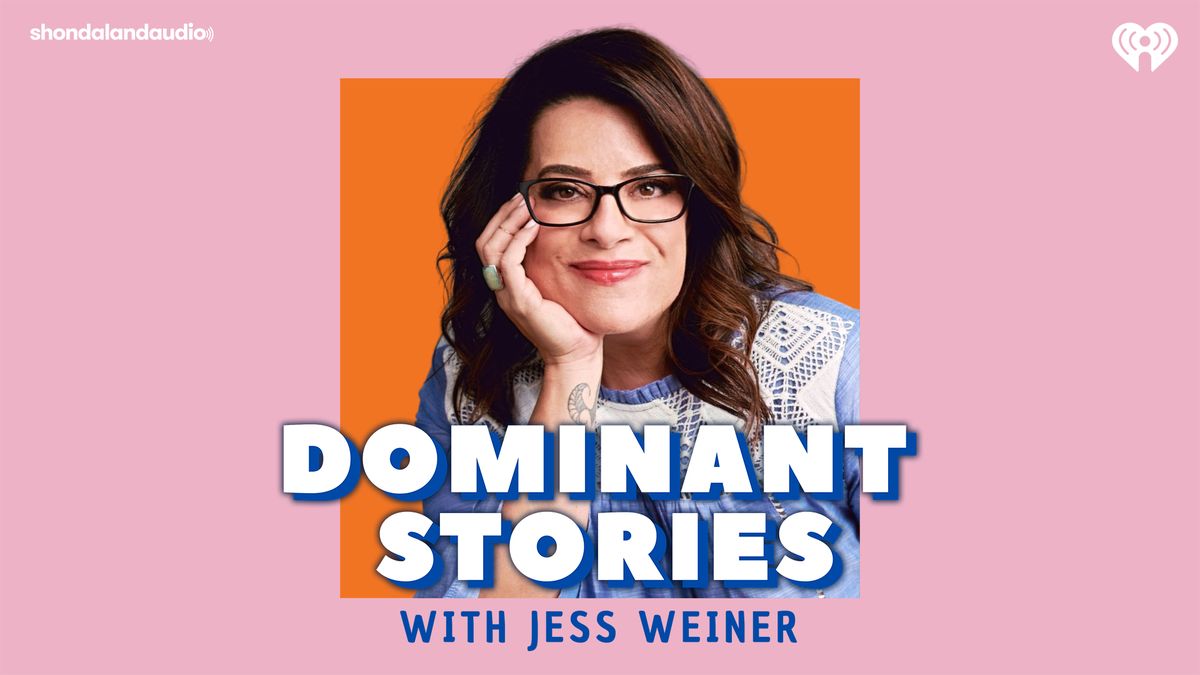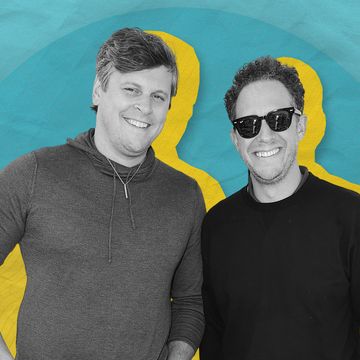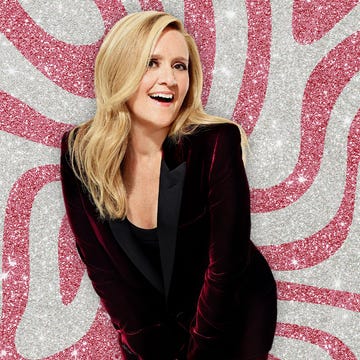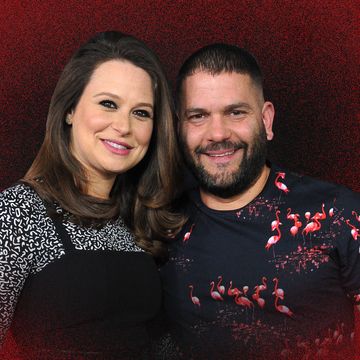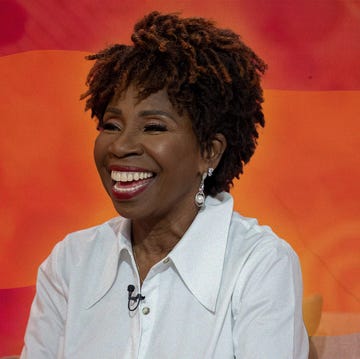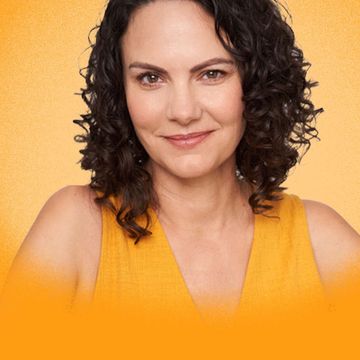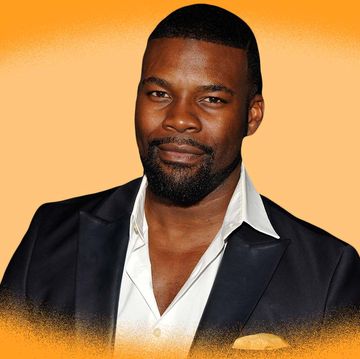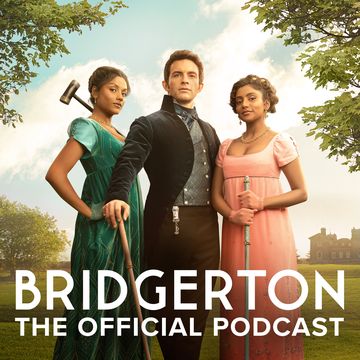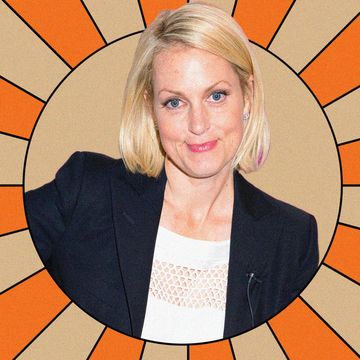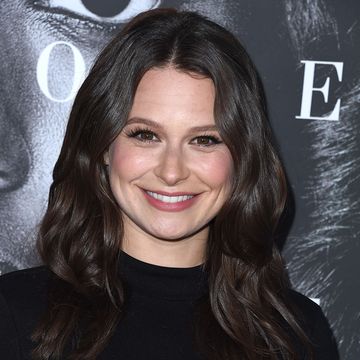For Jess Weiner — a multi-hyphenate entrepreneur who has spent the last 26 years working to understand and then educate others about cultural trends that help people feel more seen, heard, and understood — her latest podcast, Dominant Stories, is much more about the listening than it is the talking.
“I feel like I was born for this medium,” says the best-selling author about the podcast, developed by Shondaland Audio along with sponsor and longtime Shondaland partner Dove (for whom Shonda Rhimes serves as creative director on projects within the partnership). “I’ve always been a speaker, a performer, and a communicator since I was little, but as a podcast host I’m learning how to refine my listening skills and let the conversations have space. I feel like there’s intimacy baked into podcasting, and that’s what I really connect to.”
From Barbie to big corporations, Weiner has been developing her craft and tackling the parts of our culture that continually point to young women as not being enough. She has worked with Fortune 500 companies to aid them in becoming more inclusive and culturally fluent. She is an adviser to corporations like Unilever, Nike, and Warner Bros., and she helped with the evolution of Barbie at Mattel. She was also recently named one of the most creative people in business in the areas of diversity and education by Fast Company and is the creator and producer of The Good Life, an online course focused on personal and professional development.
Dominant Stories is Weiner’s newest iteration of finding ways for people to connect in this crazy world by hosting a conversation series that reclaims and rewrites the stories we’ve been told about our bodies, our beauty, our creativity, and our identities. The show grew out of Weiner’s ever-present mission to help all of us challenge the external and internal voices that so often block us from our best selves. Listeners will hear in-depth conversations with guests like Grammy-winning singer Sara Bareilles; psychotherapist and author of Maybe You Should Talk to Someone Lori Gottlieb; poet, entrepreneur, and activist Azure Antoinette; nonbinary trailblazer Addison Rose Vincent; fashion designer Christian Siriano; and even our very own Shonda Rhimes, and so many others.
As episodes of Dominant Stories continue to roll out — be sure to subscribe at iHeart, Apple, or wherever you get your favorite podcasts — Shondaland caught up with Weiner to talk about the feedback she’s gotten from listeners so far, her own breakthroughs, and what she’s learned in the podcast process.
VALENTINA VALENTINI: Have you had any good or bad reactions from listeners yet?
JESS WEINER: Yes. I got some powerful emails after the first episode with Sara. A couple came from people I knew, and then, which is always delightful, I got a few from people I didn’t know. There were maybe two themes emerging from the feedback: One is people who have already been relating to that negative inner monologue, and the framework of dominant stories gave them a way to name it. The comments have been like “Oh, I feel normal” or “Oh, if Sara Bareilles does this too, then I’m not as out of bounds as I might feel.” Then the other piece of feedback has been hearing how much listeners love the intimacy. Having these really accomplished folks speak in a way that is very personal and relatable, I mean, that was our goal with this. We wanted to get past titles and accolades that many of these folks we’re talking to have, and get to the humanity that connects us all with the stories inside of us.
VV: So, I’m a memoirist as well as a journalist and have had quite a few years of psychoanalytic therapy under my belt, so “the stories we tell ourselves” is an ever-present theme in my life. But I’m guessing that the goal with this podcast is to reach beyond people like me.
JW: Oh, I’m always so curious to hear from people who have been in psychoanalytic therapy! But I know you’re interviewing me [laughs], so I’ll answer your question. The goal of this show was to capture those who are on this self-discovery journey, a self-seeker of therapy or a self-healer — someone looking within who might already be on that journey. But we also really want to give people an invitation to explore that the voices that might be running their lives fairly dominantly don’t have to stay that way. I’ve been talking to people about self-esteem and confidence for over 20 years, and even I didn’t have the framework for this, and I had that inner monologue — I still have that inner monologue — but what I am learning from dissecting it, from being curious and examining it, is that whether you’re in therapy or not in therapy, this is an invitation to explore what voices drive your life. And then you get to ask yourself: Do you want to change any of those? Do you want to rewrite any of them? Sometimes, they feel like they’re ours, but they’re not.
VV: This podcast is also a much cheaper version of therapy!
JW: That works for us too! I think any time you’re able to talk about truth in a way that’s accessible, that’s a good thing.
VV: What can you tease us about upcoming episodes?
JW: Well, we started with Sara, who obviously commands this world stage, and then we had Lori, who’s been working on helping people change their narratives. And then we have an episode on chronic illness and what that does for your own self-esteem. We’re having lots of conversations about creativity, plastic surgery, and weight loss. I love the depth and the breadth that we’re able to engage in with this show. And I want people to know that it isn’t always this sort of intense therapy, like we’re going to open all your wounds. It’s more about the accessibility for me, so that’s why I am having guests from all different walks of life and experiences. To me, that’s the power of the storytelling opportunity with podcasts — the wide reach of narrative that we can create.
VV: In the second episode, you talked about a big breakthrough. Is that something you’re comfortable speaking about in more detail?
JW: I’m happy to. And it’s something I am going to talk a little bit more about on the show as well. So, I have been an entrepreneur for 26 years. I have built a relatively successful career in the public sphere talking about big topics like body image and beauty standards and have worked with companies to change the way they portray individuals. I feel really proud of all that. About three or four years ago, I was really on that hustle train. A lot of us really bought into the girl-boss bulls--t — to be quite candid — which was basically, “Hustle at all costs. Your work is your worth.” I fell into that in a big way. And I’d always had anxiety and depression and have learned how to balance that, but I had never had something like this happen before. I was burned out. I was unhappy. Even though I was in therapy, I didn’t have the language to articulate or the tools; I had hit a wall in my own self-development where I bought into living a version of success that wasn’t mine.
Then I had a very significant panic attack for the first time in my life. I was on an airplane, and right before takeoff, it happened. They had to turn the plane around and bring it back to the tarmac. I thought I was having a heart attack. I couldn’t breathe, I had chest pains, I was like, “Oh, my god, I’m in my 40s, and I’m having a heart attack.” So, they brought the plane back, and I got off. Over the next couple of months, I went into an intensive outpatient program where I learned about trauma and anxiety and depression, about formulating tools in my life to manage that. And that breakdown was the breakthrough that I needed to start to discard the stories that I had told myself about my worth and my value. I started to focus on what it was I really wanted and what it was that really drives me. These stories I’d told myself for so long — that the world validates an over-worker, a hustler, a people pleaser, especially if you’re a woman. Vulnerability is a feeling that I was not tapped into.
VV: Did all that lead directly into this podcast? Because it feels like that could have happened very organically.
JW: Well, I had been teaching about dominant stories as a concept for a long time — like, what are the dominant stories in culture? What are the stereotypes, the tropes? Why do we keep telling the same stories about women? But I applied it back to myself after this breakdown, and I got very curious about if I was the only one experiencing this. Which I had a slight hunch I wasn’t. But I wanted to seek out people who I admire and have a conversation on this level. And the stories just started pouring in: I’m not good enough. I’m not pretty enough. I’m too old. I’m too fat. All the things we tell ourselves so frequently. So many of us have that dialogue 24-7, and so that even when great things happen, we don’t get to fully tap in and appreciate them.
VV: In the second episode, you talk with Lori Gottlieb about being overcommitted. And you mentioned this concept of answering three out of five questions in the affirmative. Can you go into more detail about that? Because it sounded really practical and helpful.
JW: Full credit is given to my friend Luvvie Ajayi Jones, who is actually a guest coming up on this season as well! Both of us had been feeling burned out, and this was even a couple of years before my breakdown. She was going through a period of refinement in her career as a sought-after person, and we were talking about how to make decisions when you’re swimming in opportunities, which happens to lot of people who are entrepreneurs, freelancers, hustlers — like, you only eat what you kill, so you’re hunting all the time. She said that she asks herself five questions, and if three of them can be answered with a yes, then she’ll say yes to an experience or opportunity. But if you can’t get three solid yeses, then she says no. You have to adapt those questions for your specific needs, but they could be like “Will I learn something? Is this lucrative for me? Will I enjoy it? Will I meet new people?” Et cetera. So, I crafted my questions around my values and what mattered to me, and those were the filters [through] which I looked at opportunities. You can even use this for if your friends invite you out, you know? “Will this refuel me? Will I enjoy it?”
VV: As soon as we get off this call, I am writing down the five questions. I am so doing this!
JW: That is great! It made me accountable to myself in a different way. That’s why I liked the questions that had very little to do with the opportunity. It was always about coming back to me. What matters to me? What do I value? What do I need? And by putting myself in that focus, it allowed me to stay connected and accountable.
VV: Has there been anything you’ve come across in Dominant Stories that has really affected you?
JW: One comes to mind: A conversation that I had with Azure Antoinette where we talk about chronic illness and body image. She is an incredible poet who has multiple sclerosis. That conversation moved me quite a bit. I have struggled with my body image since I was 11 years old — the first time I went on a diet. I have had a whole career built on talking about body positivity and beauty. Like, this is my zeitgeist. And yet I hadn’t ever experienced a chronic illness. So, I hadn’t thought about the added layer of what happens when you are not in control of the physical health of your body, and the chronic disconnect that that creates for you with your body. Part of my healing with body-image issues has been how to learn to love my body at all stages, all weights, all experiences. And this conversation with Azure really invited me in to ask, “How could I love my body through a chronic illness? How would I think about my body differently?” There is a public discourse around chronic illness and body image that we don’t hear a lot about.
VV: Is there a topic or a theme that you are really looking forward to tackling?
JW: I would say this is a real personal one for me, and I am really looking forward to talking about it: Can you love yourself and still want to lose weight? Can you love yourself and still want plastic surgery? I have had a physical transformation — I have lost 100 pounds in my life, and I have never really talked about that publicly. I have lived in various sized bodies throughout my life and wrestled quite a bit with that question — does wanting to change your physical appearance nullify a sense of body love, or can you make a change from a place of loving your body and still want to change it? It’s not an either/or conversation; it’s a “yes and” conversation. I will talk to some folks who have also gone on similar journeys.
VV: Is there anything else you want to leave with your listeners?
JW: One thing that was important for me and for Shondaland and everyone working on this podcast was to make sure that we had actionable takeaways at the end of the conversations. A lot of times, we listen to podcasts passively while we’re driving or we’re taking a walk or bathing our kids. And that is great too, but I also wanted to make sure that if you were really connected to the topic, that you would leave each conversation with one tiny action step that you can do. Changing your story is fluid, and if every episode has tiny takeaways, we can look for moments to remember to help change our stories. So, throughout the season I’m going to give tangible next steps that folks can take. The most beautiful changes I’ve made in my life have come from these messy, arduous, tiny, seemingly not successful steps that just keep leading to the next and the next and the next. I want to deconstruct what it means to actually change your story. And it’s not going to be perfect, so how do we start?
Valentina Valentini is a London-based entertainment, travel, and food writer and also a Senior Contributor for Shondaland. Elsewhere she has written for Vanity Fair, Vulture, Variety, Thrillist, Heated, and The Washington Post. Her personal essays can be read in the Los Angeles Times, Longreads, and her tangents and general complaints can be seen on Twitter at @ByValentinaV.
Get Shondaland directly in your inbox: SUBSCRIBE TODAY
